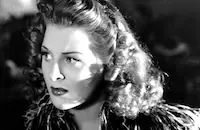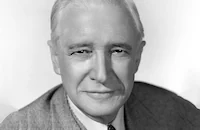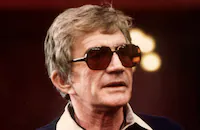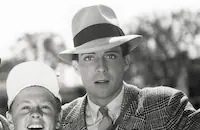Ladies Courageous
Cast & Crew
John Rawlins
Loretta Young
Geraldine Fitzgerald
Diana Barrymore
Anne Gwynne
Evelyn Ankers
Film Details
Technical Specs

Synopsis
Roberta Harper is placed in charge of the Women's Auxiliary Ferrying Squadron, better known as the WAFS, a war-time unit of twenty-five women who ferry planes across the United States so that male pilots can be released for combat service. After six months, Col. Andy Brennan, Roberta's commander, tells her that many in the military are still worried that her squadron cannot handle the more difficult and dangerous tasks required of the ferrying service. Within her own ranks, Roberta has problems with her ambitious sister, Virginia "Virgie" Alford, a globe-trotter who pursues glory for herself above all else. In addition, a romantic triangle develops when aviatrix Nadine begins to court Alex Anderson, though he is secretly married to fellow flyer Jill Romilly. Meanwhile, Gerry Vail, the best aviatrix in the WAFS, worries about her upcoming 100th mission for the unit, as it was during their 100th performance that her father and two brothers, the famous flying circus known as "The Flying Vails," were killed in an aerial accident. Roberta soothes Gerry's fears, however, by informing her that she already flew her 100th mission two weeks earlier. Tragedy does strike the WAFS, however, as Jill's plane crashes soon after takeoff, leading a guilt-ridden Nadine to promise to fly twice as many missions in her place. Soon, the WAFS are given their first overseas assignment, the delivery of planes to a secret South Pacific base, but the mission is canceled when publicity-seeking Virgie purposely crashes her plane in Tucson during a military review, stealing the headlines from the newly decorated war heroes. On the train back to her base, however, Virgie has a change of heart about her actions when she sees her estranged husband, Frank Garrison, on his way to Leavenworth prison for desertion. Despite her sincere apologies, Virgie is "washed-out" of the WAFS by Roberta, who then learns that her husband Tommy has been listed as "missing in action." Accepting the blame for her sister's actions, Roberta resigns as head of the WAFS, so Virgie tries to steal a plane and fly to Washington to straighten things out. Instead, she crashes the plane during an aborted takeoff and is nearly killed. Meanwhile, Brigadier General Wade informs the female pilots that they have been incorporated in the military and will now be known as the Women's Air Force Service Pilots. Their first mission is to deliver war planes to a secret South Seas base known as "Easy Queen Island." Just before takeoff, Roberta is reunited with Tommy, who has returned to the States safe and sound.

Director
John Rawlins
Cast

Loretta Young

Geraldine Fitzgerald
Diana Barrymore

Anne Gwynne

Evelyn Ankers

Phillip Terry
David Bruce

Lois Collier
June Vincent

Samuel S. Hinds
Richard Fraser
Frank Jenks
Janet Shaw
Kane Richmond
Billy Wayne
Gwen Crawford
Dorothy Moore
Marie Harmon
Bernard Sell
John James
Mel Schubert
John Whitney

Buddy Yarus
Michael Owen
Carlyle Blackwell Jr.
Bob Lowell
John Dawson
Michael Kirk

Blake Edwards
Billy Lechner
Joel Allen
Mary O'brien
Patsy Mace
Eleanor Lawson
Betty Brodel
Carrie Devan
Mary Alice Moore
Jacqueline Warrington
Audrey Manners
Sandra Coles
Betsy Howard

Ruth Roman
June Millarde

Fay Helm

James Flavin
Mary Forbes

Maude Eburne
Mary Gordon
Richard Crane
Arthur Space

Dennis Moore

Steve Brodie
Matt Mchugh
Eddy Waller
Grandon Rhodes
Eddie Coke
Monte Lee
Franklin Parker
Richard Graham
Richard French
Doris Linden
Don Mcgill
Margaret Brayton

Lillian Bronson
Clarence Straight
Ralph Linn
Michael Dennis
Chester Carlisle
William Sloan
Kate Mackenna
Edwin Stanley
Crew
Bernard B. Brown
Philip Cahn
Capt. Charlton Fincher
William Fox
John P. Fulton
R. A. Gausman
Doris Gilbert
A. J. Gilmore
Alexander Golitzen
John B. Goodman
Marjorie Kumler
Hal Mohr
Norman Reilly Raine
Lynn Shores
Harold Tarshis
Dimitri Tiomkin
Barbara Towne
William Tummel
Walter Wanger
Walter Wanger
Vera West

Film Details
Technical Specs

Articles
Geraldine Fitzgerald (1913-2005)
Born in Dublin on November 24, 1913, Fitzgerald was educated for a time in a convent school in London. Back in her native Dublin, she happily accompanied her aunt, the Irish actress Shelah Richards, to a theater one afternoon when the director mistook her for an actress, and instructed her "to go backstage and change." An inauspicious start, but it gave her the acting bug. She made her stage debut in 1932 in Dublin's Gate Theater and later appeared in a few forgettable British films: Open All Night (1934), The Ace of Spades, Three Witnesses (both 1935). She made the trip across the Atlantic in 1938 to act with Orson Welles and his Mercury Theater, but agents from Warner Bros. quickly signed her and she was soon off to Hollywood.
She made her film debut in 1939 supporting Bette Davis in Dark Victory, but it was her performance in a second film later in the year that proved to be the most memorable of her career - the role of Isabella Linton in Wuthering Heights. She earned an Oscar® nomination for her turn and stardom should have been around the corner, but Fitzgerald's feuding with studio head Jack Warner (he refused to let her return to the New York stage and she would refuse parts that she thought were inferior) led to some lengthy suspensions of unemployment. Irregardless, Fitzgerald still had some shining moments at Warner Bros. the heady melodrama The Gay Sisters (1942); the superb espionage thriller Watch on the Rhine (1943); Robert Siodmak's terrific, noirish thriller The Strange Affair of Uncle Harry (1945); and a tough crime drama where she played opposite John Garfield Nobody Lives Forever (1946).
Fitzgerald returned to New York by the '50s, and found much work in many of the live television dramas that were so popular in the day: Goodyear Television Playhouse, Lux Video Theatre, Studio One, Schlitz Playhouse of Stars; and even some taped television shows: Naked City, Alfred Hitchcock Presents in between her stage demands.
She did return to the screen by the mid-'60s and proved herself a fine character actress in films like The Pawnbroker (1965); Rachel, Rachel (1968); Harry and Tonto (1974); a wonderfully memorable comic turn as Dudley Moore's feisty grandmother in Arthur (1981); and yet another noteworthy performance as Rose Kennedy in the acclaimed mini-series Kennedy (1983). She also appeared in a few television programs: St. Elswhere, Cagney & Lacey, and The Golden Girls before ill-health forced her to retire by the early '90s. Among the relatives that survive her are her son, director Michael Lindsay-Hogg (Brideshead Revisited; a daughter, Susan Scheftel; and her great-niece, the English actress Tara Fitzgerald.
by Michael "Mitch" Toole

Geraldine Fitzgerald (1913-2005)
Quotes
Trivia
Notes
The working title of this film was When Ladies Fly. The film begins with the following written foreword: "Thousands of airplanes are rolling off the assembly line in our factories destined for the Allied fighter pilots and combat crews all over the world. Delivering these planes safely and in the shortest possible time is one of the great jobs of this war and the men and women of the Air Transport Command can be justly proud of their record. This story is about that small band of women who-from all walks of life-pioneered the formation of the Women's Auxiliary Ferrying Squadron." The New York Times review pointed out that the film received official government approval, as it had been "sanctioned by the United States Army Air Force as the official motion-picture of the Women's Auxiliary Ferrying Squadron, now known as the WASPS. Women's Air Force Service Pilots."
According to a memorandum prepared by Col. Curtis Mitchell, Chief of the Pictorial Branch, to the assistant of the Director for the U.S. Army Air Forces, located in NARS, the genesis of Ladies Courageous began on September 22, 1942 when Col. Mason Wright, the chief of the motion picture branch of the War Department Bureau of Public Relations, suggested to producer Walter Wanger that a film be made about WAFS. After registering the script idea, Wanger was allowed to visit the WAFS at Newcastle, in Wilmington, Delaware. A script by Norman Reilly Raine and Doris Gilbert, under the title When Ladies Fly, was later submitted to the War Department on May 27, 1943, and was approved without objections on 8 June 1943.
Once the film began production, however, Wanger encountered military interference when he attempted to film some scenes at the Army Air Base at Long Beach, CA. Mitchell's memorandum refers to a letter, dated November 24, 1943, in which Wanger states that a Col. Westlake informed him that the Army had reversed its position on the film, stating that the picture was now out of date due to the incorporation of the WAFS into the WASPS and that the air service would not be providing the necessary equipment to make the film. A letter was then sent to Wanger on September 6, 1943, stating that approval of When Ladies Fly had been officially withdrawn because of script changes and that the current shooting script contained twelve elements to which the Army objected.
After meeting with Army Air Forces' representatives, Wanger proved that the film, already well into its $900,000 production budget, was being "filmed in accordance with approved script of 8 June 1943, and that deletions requested on 6 September 1943 were originally authorized in script approval by the War Department on 8 June 1943." Mitchell then pointed out that, although Wanger would have been fully within his rights to continue filming the original script, "being handicapped at this point by having cooperation withheld, he [Wanger] had no alternative but to comply with the request [script changes]." Mitchell then concluded the memorandum by noting that because Ladies Courageous contained no security violations, the military was being "portrayed with respect" and all necessary script changes had been made, the War Department was "then bound by its established policies to approve the [film's] release."
Hollywood Reporter news items and production charts include Ramsay Ames and Vivian Austin in the cast, but their appearance in the released film has not been confirmed.














